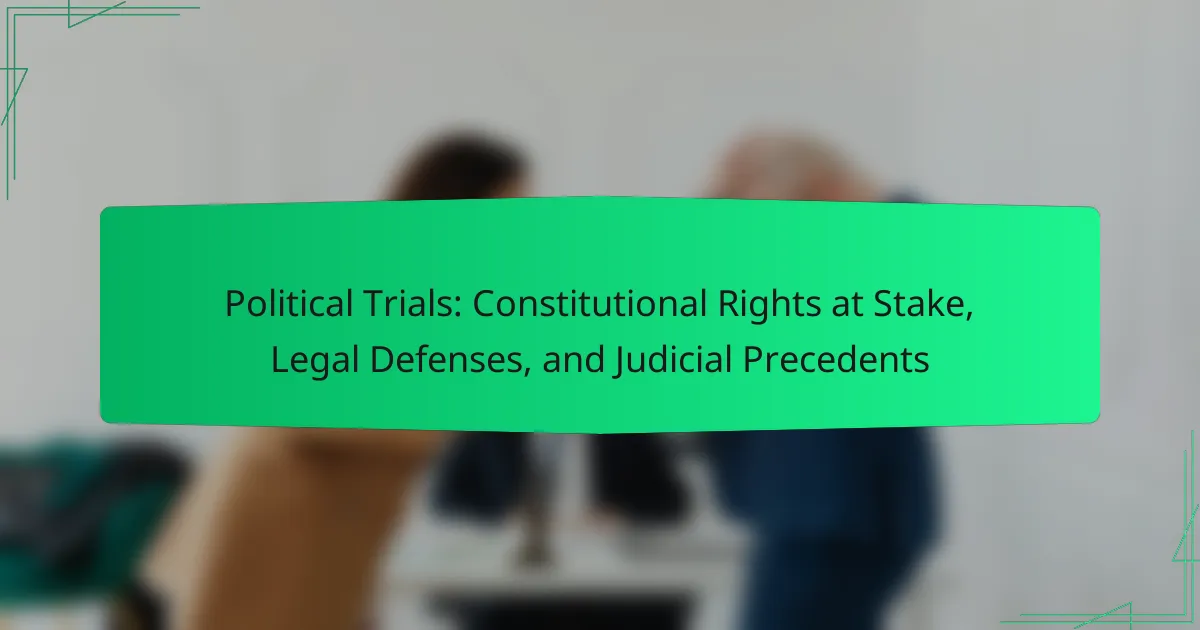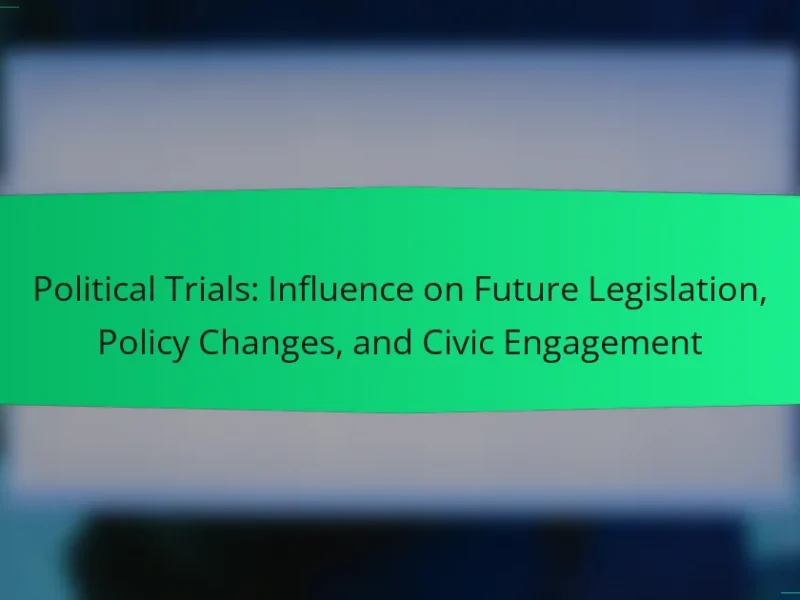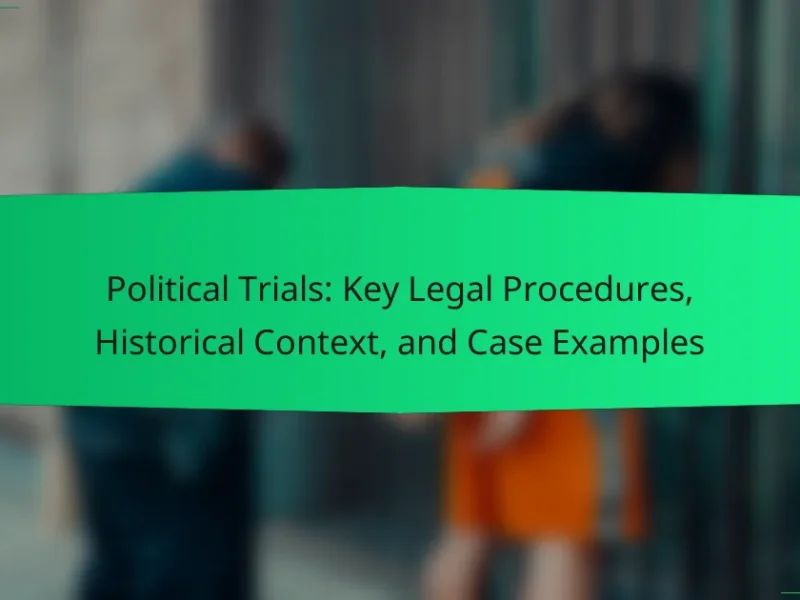Political trials are legal proceedings involving political figures or issues, often stemming from allegations of misconduct or corruption with significant implications for public trust in government and the rule of law. This article examines the impact of political trials on democracy, highlighting how they can undermine judicial integrity, lead to biased legal outcomes, and suppress dissent. Key historical examples illustrate the consequences of politicized legal systems, such as during the McCarthy era in the United States. The discussion emphasizes the importance of constitutional rights, legal defenses, and judicial precedents in understanding the broader implications of political trials on civic engagement and accountability.
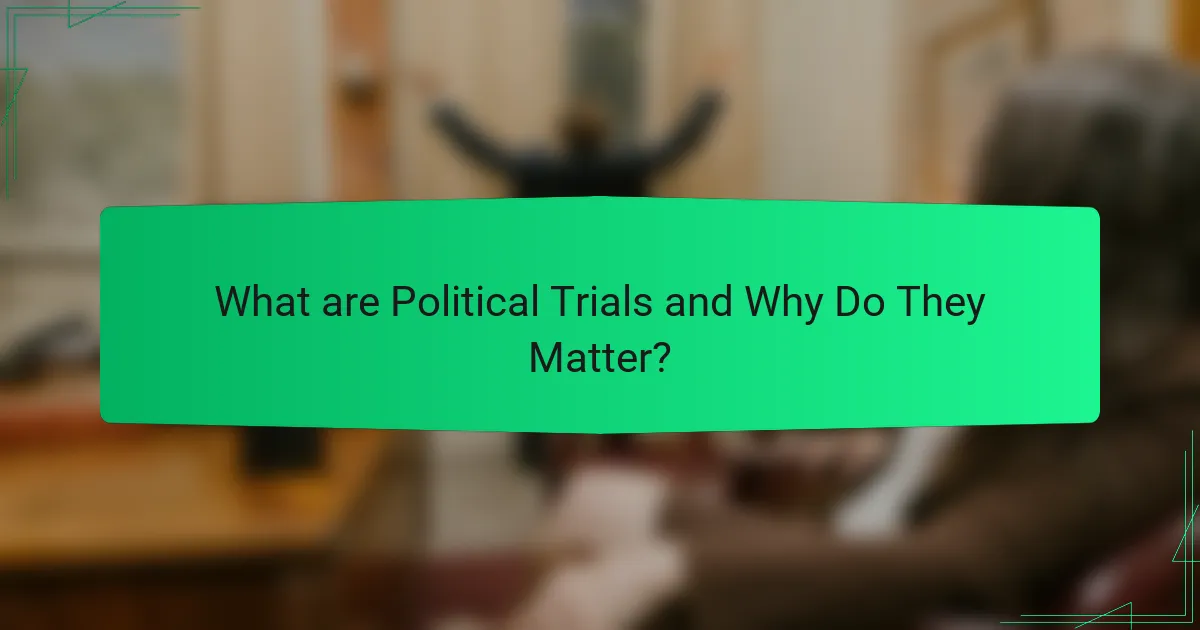
What are Political Trials and Why Do They Matter?
Political trials are legal proceedings that involve political figures or issues. They often arise from allegations of misconduct, corruption, or violations of laws that have political implications. Political trials matter because they can significantly impact public trust in government and the rule of law. They can also influence political stability and the balance of power within a society. Historical examples include the trials of political leaders during regime changes, which highlight their role in shaping political landscapes. Additionally, these trials often raise questions about constitutional rights and legal defenses, making them critical to understanding judicial precedents.
How do Political Trials impact Constitutional Rights?
Political trials can significantly impact constitutional rights by challenging the balance between state power and individual freedoms. These trials often raise issues related to due process, free speech, and the right to a fair trial. For example, political trials may result in biased judicial proceedings influenced by governmental interests. This can undermine the impartiality required for fair legal representation. Historical instances, such as the trials during the McCarthy era, illustrate how political motivations can lead to violations of civil liberties. In these cases, individuals faced prosecution based on their political beliefs rather than actual criminal conduct. Consequently, political trials can erode public trust in the judicial system and the protection of constitutional rights.
What specific Constitutional Rights are often at stake in Political Trials?
The specific Constitutional Rights often at stake in Political Trials include the First Amendment, Fourth Amendment, and Sixth Amendment. The First Amendment protects freedom of speech and assembly, which can be challenged in trials involving political dissent. The Fourth Amendment safeguards against unreasonable searches and seizures, impacting the collection of evidence in politically motivated cases. The Sixth Amendment guarantees the right to a fair trial and legal counsel, which is crucial for defendants in political trials. Historical cases, such as the trial of the Chicago Seven, illustrate these rights being contested. In that instance, defendants faced charges that raised significant First and Sixth Amendment issues.
How do Political Trials challenge the balance of power in government?
Political trials challenge the balance of power in government by creating tensions between branches of government. These trials often involve high-profile figures, such as elected officials. When the judiciary intervenes in political matters, it can undermine legislative and executive authority. This can lead to accusations of judicial overreach or bias. Historical examples include the impeachment trials of U.S. Presidents. Such trials can shift public opinion and alter the political landscape. They may also provoke reactions from the executive branch, seeking to assert its power. Ultimately, political trials can destabilize established power dynamics within government.
What legal defenses are commonly employed in Political Trials?
Common legal defenses in political trials include the defense of necessity, self-defense, and the argument of political motivation. The defense of necessity argues that the accused acted to prevent a greater harm. Self-defense claims that actions were taken to protect oneself from imminent danger. Political motivation asserts that the prosecution is targeting the defendant for their political beliefs. These defenses are often used to challenge the legitimacy of the charges. Historical examples include the use of necessity in civil disobedience cases. In political trials, these defenses aim to highlight the intersection of law and political expression.
What are the most effective legal strategies used in defending against political charges?
The most effective legal strategies in defending against political charges include challenging the constitutionality of the charges, utilizing selective prosecution defenses, and asserting First Amendment protections. Challenging the constitutionality involves questioning whether the laws under which the charges are brought violate constitutional rights. Selective prosecution defenses argue that the charges are based on political bias rather than legitimate legal grounds. Asserting First Amendment protections can defend actions taken as part of free speech or political expression. Historical cases, such as the acquittal of political figures in landmark trials, demonstrate the effectiveness of these strategies. These defenses can lead to dismissals or favorable verdicts in politically charged cases.
How do defendants argue against the legitimacy of Political Trials?
Defendants argue against the legitimacy of political trials by claiming violations of due process. They assert that these trials are politically motivated rather than based on legal evidence. Defendants often highlight the lack of impartiality in the judicial process. They may point to biased judges or juries as evidence of unfair treatment. Additionally, defendants argue that the charges are exaggerated or fabricated to suppress dissent. Historical examples, such as the McCarthy hearings, illustrate how political agendas can influence judicial outcomes. Defendants also emphasize that political trials undermine fundamental rights, such as freedom of speech and assembly. By citing these factors, defendants aim to demonstrate that political trials lack legitimacy and fairness.
What role do Judicial Precedents play in Political Trials?
Judicial precedents play a significant role in political trials by providing legal frameworks for decision-making. They guide judges in interpreting laws and applying them to specific cases. Precedents ensure consistency and predictability in legal outcomes. In political trials, precedents can influence the interpretation of constitutional rights. For example, landmark cases like Baker v. Carr have shaped the understanding of political representation. These precedents can also affect the admissibility of evidence and the standards for legal defenses. Ultimately, judicial precedents serve as a crucial reference point in navigating the complexities of political trials.
How have past Judicial Precedents shaped current Political Trial outcomes?
Past judicial precedents significantly influence current political trial outcomes. They establish legal standards and interpretations that guide judges and attorneys. For example, landmark cases like “United States v. Nixon” set precedents regarding executive privilege and accountability. These precedents shape the legal strategies employed in contemporary political trials. Additionally, rulings from cases such as “Bush v. Gore” affect how courts handle election-related disputes. Courts often reference these precedents to ensure consistency in legal reasoning. This reliance on historical decisions helps uphold the rule of law in politically charged environments. Ultimately, past judicial precedents provide a framework that shapes the judicial process in current political trials.
What are some landmark cases that influence the understanding of Political Trials?
Landmark cases that influence the understanding of political trials include the trial of Socrates, the Dred Scott case, and the Rosenberg trial. The trial of Socrates in 399 BC exemplified the conflict between individual rights and state authority. It raised questions about free speech and the consequences of dissent. The Dred Scott v. Sandford case in 1857 highlighted issues of citizenship and civil rights. It underscored the legal limitations faced by African Americans. The Rosenberg trial in the 1950s illustrated the impact of Cold War politics on judicial processes. It brought attention to the use of espionage laws in politically charged contexts. Each case has shaped legal interpretations and public perceptions of political trials.
How do Political Trials reflect societal values and issues?
Political trials reflect societal values and issues by showcasing the intersection of law and public sentiment. These trials often reveal the prevailing attitudes toward justice, authority, and governance. For instance, high-profile cases like the trial of former President Donald Trump illustrate how political affiliations can influence perceptions of legality. They can also highlight societal divisions, as seen in the varying public responses to trials based on political context. Historical examples, such as the Nuremberg Trials, demonstrate how societies confront past atrocities and seek accountability. Ultimately, political trials serve as a mirror, reflecting the complexities of societal norms and ethical standards.
What role does public opinion play in the proceedings of Political Trials?
Public opinion significantly influences the proceedings of political trials. It can shape perceptions of fairness and justice. When public sentiment is strong, it may pressure judicial outcomes. High-profile cases often attract media attention, amplifying public discourse. This can affect the behavior of judges and juries. For example, the trial of O.J. Simpson showcased how public opinion swayed media narratives. Additionally, public protests or support can impact trial proceedings and decisions. These dynamics highlight the interplay between societal views and legal processes.
How do Political Trials highlight issues of justice and fairness in the legal system?
Political trials highlight issues of justice and fairness in the legal system by exposing potential biases and inequities. These trials often involve politically charged cases that can influence public perception and judicial impartiality. The defendants may face unequal treatment compared to ordinary criminal cases. For example, political figures may receive harsher scrutiny or leniency based on their affiliations. Historical instances, such as the trial of former Illinois Governor Rod Blagojevich, illustrate how political motivations can overshadow legal principles. Such cases raise questions about the integrity of the judicial process. They challenge the notion of equal justice under the law, revealing systemic flaws. Ultimately, political trials serve as a lens through which the fairness of the legal system can be critically examined.
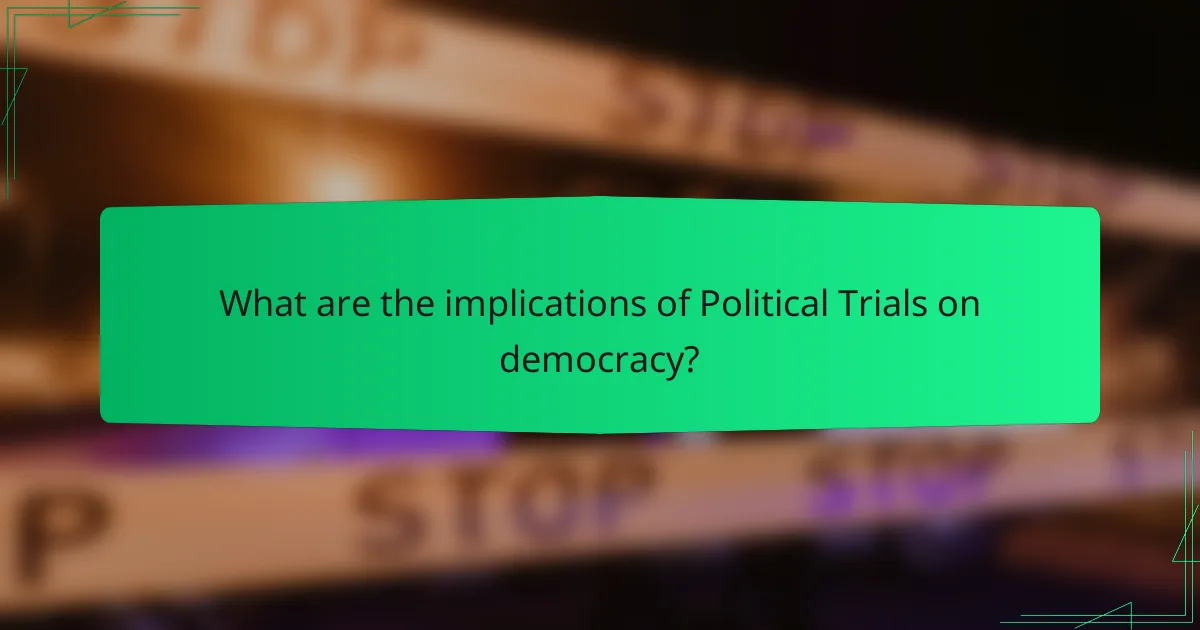
What are the implications of Political Trials on democracy?
Political trials can undermine democracy by eroding public trust in judicial processes. They often politicize the legal system, leading to biased outcomes. This can result in selective prosecution, where political opponents are targeted. Such actions can suppress dissent and limit freedom of expression. Historical examples include the McCarthy era in the United States, where political motivations influenced legal actions against individuals. The implications extend to weakening checks and balances, as the judiciary may become an instrument of political power. This can stifle democratic engagement and diminish accountability. Ultimately, political trials can create a chilling effect on civic participation and undermine the rule of law.
How do Political Trials affect public trust in the legal system?
Political trials can significantly undermine public trust in the legal system. When political motives influence legal proceedings, perceptions of fairness diminish. This perception is supported by historical instances, such as the trials during the McCarthy era, where many viewed the judiciary as a tool for political agendas. Research indicates that public confidence in the legal system decreases when trials are perceived as politically motivated rather than based on objective legal standards. A study by the Pew Research Center found that 61% of Americans believe political considerations impact judicial decisions. Such beliefs can lead to widespread skepticism about the integrity of legal institutions. Therefore, political trials can create lasting damage to the public’s faith in justice.
What are the potential consequences of unjust Political Trials on democratic institutions?
Unjust political trials can severely undermine democratic institutions. They erode public trust in the judicial system. When the judiciary is perceived as biased, it threatens the rule of law. This can lead to increased political polarization and social unrest. Citizens may feel disenfranchised and less likely to participate in democratic processes. Historical examples include the McCarthy era in the United States, where unjust trials targeted political dissenters. This period saw a significant chilling effect on free speech and political expression. Ultimately, unjust political trials can destabilize governance and weaken democratic norms.
How can Political Trials lead to reforms in legal practices and policies?
Political trials can lead to reforms in legal practices and policies by exposing systemic injustices. These trials often highlight flaws in the legal system, prompting public and legislative scrutiny. Historical examples include the Nuremberg Trials, which established principles of international law. Such trials can catalyze the introduction of new legal standards and protections. They can also inspire changes in legislation to prevent future abuses. The visibility of political trials can mobilize civic engagement and demand for accountability. As a result, reforms may emerge to strengthen legal frameworks and ensure fairness.
What are the challenges faced by defendants in Political Trials?
Defendants in political trials face significant challenges. These include biased judicial environments that undermine fair trial rights. Political motivations can skew legal proceedings against defendants. Access to impartial legal representation is often limited. Defendants may encounter public hostility and media scrutiny. Evidence may be manipulated or selectively presented. The legal framework may be used to suppress dissent. Historical examples, like the McCarthy hearings, illustrate these challenges.
What unique obstacles do defendants encounter compared to non-political cases?
Defendants in political cases face unique obstacles not encountered in non-political cases. These obstacles often include heightened scrutiny from the media and public. This scrutiny can influence juror perceptions and affect the fairness of trials. Additionally, defendants may experience more severe legal repercussions due to the political implications of their actions. Political cases often involve complex legal issues related to constitutional rights. Defendants may also struggle with limited access to resources for their defense. Furthermore, political motivations can lead to biased judicial proceedings. The potential for government overreach also complicates the legal landscape for these defendants. Overall, these factors create a distinct set of challenges in political trials.
How do defendants navigate media scrutiny during Political Trials?
Defendants navigate media scrutiny during political trials by employing strategic communication tactics. They often work with public relations professionals to manage their image. This includes preparing statements that address media narratives. Defendants may also limit their public appearances to control the message. Legal counsel plays a crucial role in advising on what can be disclosed. They ensure that any public comments do not jeopardize the legal defense. Additionally, defendants may utilize social media to directly communicate with the public. This allows them to counter misinformation effectively. Historical examples, such as the trials of political figures, show that proactive media management can influence public perception.
What best practices can be adopted for fair Political Trials?
Fair political trials can be ensured by implementing several best practices. These practices include ensuring impartiality in the selection of judges and jurors. Transparency in the trial process is essential to maintain public trust. Access to legal representation must be guaranteed for all defendants. The right to a public trial is crucial for accountability. Adequate time for preparation and defense is necessary to uphold fairness. Avoiding political influence in judicial decisions is vital for integrity. Lastly, adherence to established legal standards and procedures helps protect constitutional rights. Historical examples, such as the Nuremberg Trials, highlight the importance of these practices in achieving justice.
What measures can be implemented to ensure transparency in Political Trials?
Implementing measures for transparency in political trials involves several key strategies. First, public access to trial proceedings should be guaranteed. This includes allowing media coverage and live broadcasts. Second, independent observers should be present during trials. Their role is to report on the fairness and conduct of the proceedings. Third, clear documentation of all trial activities should be maintained. This ensures that records are available for public scrutiny. Fourth, judges should provide reasoned judgments that are accessible to the public. This promotes understanding of the legal rationale behind decisions. Fifth, legal representation should be available to all defendants. This ensures that they can present their case effectively. Lastly, regular audits of the judicial process can help identify and address issues of bias or misconduct. These measures collectively enhance accountability and public trust in the judicial system.
How can legal systems protect the rights of defendants in Political Trials?
Legal systems can protect the rights of defendants in political trials through various mechanisms. These include ensuring fair trial rights, providing access to legal representation, and upholding the presumption of innocence. Fair trial rights are enshrined in international human rights instruments, such as the International Covenant on Civil and Political Rights. Access to legal representation is critical, as it allows defendants to mount an effective defense. The presumption of innocence ensures that defendants are not considered guilty until proven otherwise. Additionally, legal systems can implement judicial oversight to prevent abuses of power. Transparency in proceedings also serves to safeguard defendants’ rights. Historical examples, such as the Nuremberg Trials, illustrate the importance of these protections in maintaining justice.
Political trials are legal proceedings involving political figures or issues, often arising from allegations of misconduct that can impact public trust and political stability. This article examines the implications of political trials on constitutional rights, including the First, Fourth, and Sixth Amendments, and discusses common legal defenses employed in these cases. It highlights the role of judicial precedents in shaping trial outcomes and the challenges faced by defendants, such as media scrutiny and biased judicial environments. Additionally, the article addresses how political trials can influence democracy, public trust in the legal system, and the potential for reforms in legal practices and policies.
